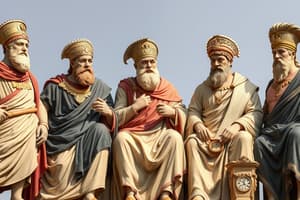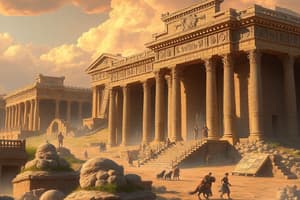Podcast
Questions and Answers
Which of the following statements are true about the Roman Empire? (Select all that apply)
Which of the following statements are true about the Roman Empire? (Select all that apply)
- Citizenship was limited to males. (correct)
- Rome's economy was entirely based on trade.
- War began because Greeks supported Ionian Greeks against the Persians. (correct)
- Athens played no role in democracy.
What did the Gupta Empire introduce that was significant in mathematics?
What did the Gupta Empire introduce that was significant in mathematics?
Arabic numerals
Slavery was a large part of the Persian Empire.
Slavery was a large part of the Persian Empire.
False (B)
Who founded the Persian Achaemenid Dynasty?
Who founded the Persian Achaemenid Dynasty?
The Qin Dynasty ended the _____ states period.
The Qin Dynasty ended the _____ states period.
Which philosophy influenced Chinese governance during the Qin and Han Dynasties?
Which philosophy influenced Chinese governance during the Qin and Han Dynasties?
What was a major characteristic of the Mayan Empire?
What was a major characteristic of the Mayan Empire?
Match the following civilizations with their key features:
Match the following civilizations with their key features:
What role did religion play in the Bantu civilization?
What role did religion play in the Bantu civilization?
Teotihuacan was known for its lack of artistic representation.
Teotihuacan was known for its lack of artistic representation.
Flashcards are hidden until you start studying
Study Notes
Roman Empire
- Composed of city-states with significant slavery in the economy.
- Citizenship restricted to males; prominent democracy in Athens.
- Conflict between Greeks and Persians (490-480 BC) sparked by Greek support for Ionian rebels.
- Athens became the capital of Greece after the war.
- Rome originated as a city-state and expanded through military might.
- Constantine embraced Christianity, impacting the empire significantly.
Mauryan, Kushan, and Gupta Empires
- Gupta Empire introduced Arabic numerals.
- Governance during the Gupta period was less centralized compared to earlier administrations.
Persian Empire
- Founded by King Cyrus in 539 BC; known for the conquest of Mesopotamia and Babylon.
- Darius I extended the empire from the Indus Valley to Egypt and Anatolia.
- Conquered regions retained local rulers under the condition of paying taxes and allegiance.
- Zoroastrianism introduced dualism of good vs. evil and discouraged slavery.
- Xerxes was the Persian king during the conflict with Greece.
- Achaemenid Dynasty drew influence from Babylonian and Assyrian cultures.
Qin and Han Dynasties
- Qin Dynasty marked the end of the Warring States period through brutality.
- Confucius's philosophy emerged during this time, promoting societal stability.
- Confucianism shaped governance and education practices in China.
- The ideal man, "Junzi," emerged as a moral model for society.
- Qin unified China through military conquest and advanced iron weaponry.
Teotihuacan
- Artistic expressions included structures, murals, and artwork centered on deities.
Mayan Empire
- Kings acted as shamans, bridging the human and supernatural realms.
- Developed advanced mathematical systems and understood the solar system.
- Writing system featured pictographs, often inscribed on stone.
- Political structure comprised city-states, local lords, and regional kingdoms.
- Frequent warfare involved capturing and sacrificing prisoners.
Niger Valley Civilization
- Drought in the Sahara prompted migration to the Niger Valley.
- Introduced domesticated animals, agricultural techniques, and ironworking skills.
- Artisan communities formed distinct castes; job roles and marriage were restricted within these groups.
Nubia/Meroe
- Governed by a monarch with egalitarian views towards women.
- Nubians engaged in trade and military confrontation with Egypt; at times, they conquered Egypt.
- Notable industries included iron smelting and tool manufacturing.
- Economic strength derived from Nile trade and camel caravans; faced decline due to deforestation.
Axum
- Christianity was established as the state religion.
- Economy relied on plow-based agriculture and taxation systems.
- The rise of Islam shifted trade routes, leading to decreased revenue.
Bantu
- Religious beliefs centered around nature and ancestral spirits.
- Migration led to the development of a group of related languages known as Bantu.
Moche
- Economy was heavily dependent on a sophisticated irrigation system.
- Governed by a class of warrior priests.
Mound Builders
- Society exhibited sharp class distinctions with enforced upper-lower class marriages.
- Commoners referred to as "stinkards."
Wari and Tiwanaku
- Trade facilitated by caravans of llamas linking agricultural centers.
- Wari utilized hillside terracing and irrigation, while Tiwanaku developed an advanced raised field system.
Studying That Suits You
Use AI to generate personalized quizzes and flashcards to suit your learning preferences.




